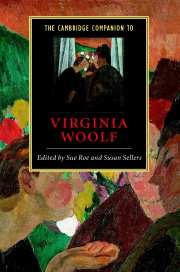Book contents
- Frontmatter
- 1 Bloomsbury
- 2 Finding a voice
- 3 Literary realism in Mrs Dalloway, To the Lighthouse, Orlando and The Waves
- 4 The novels of the 1930s and the impact of history
- 5 Virginia Woolf's essays
- 6 Virginia Woolf's diaries and letters
- 7 Virginia Woolf and the language of authorship
- 8 Virginia Woolf and modernism
- 9 The impact of post-impressionism
- 10 The socio-political vision of the novels
- 11 Woolf's feminism and feminism's Woolf
- 12 Virginia Woolf and psychoanalysis
- Guide to further reading
- Index
12 - Virginia Woolf and psychoanalysis
Published online by Cambridge University Press: 28 May 2006
- Frontmatter
- 1 Bloomsbury
- 2 Finding a voice
- 3 Literary realism in Mrs Dalloway, To the Lighthouse, Orlando and The Waves
- 4 The novels of the 1930s and the impact of history
- 5 Virginia Woolf's essays
- 6 Virginia Woolf's diaries and letters
- 7 Virginia Woolf and the language of authorship
- 8 Virginia Woolf and modernism
- 9 The impact of post-impressionism
- 10 The socio-political vision of the novels
- 11 Woolf's feminism and feminism's Woolf
- 12 Virginia Woolf and psychoanalysis
- Guide to further reading
- Index
Summary
Psychoanalysis is the science and clinical practice that was born from Freud's discovery of the unconscious and that began to spread with the publication of his Interpretation of Dreams in 1900. Freud's invention of the 'talking cure' placed language firmly at the centre of its theory and practice. Throughout the twentieth century, in the West, psychoanalysis has had a huge impact on how human beings think of their own mental and psychic life. It has led to new ways of looking at art, new ways of reading texts, literature in particular.
Woolf's relation to psychoanalysis was manifold. Critics have interpreted it essentially in three ways: in terms of her own mental illness; of her involvement in, knowledge of and attitude to Freud and his followers; of the impact of psychoanalytic concepts upon her own writing and of the occurrence, in her writing and relation to language, of concepts and practices similar or alternative to psychoanalytic ones. In addition, psychoanalytic interpretations of her life and work have been offered. This triple - or quadruple - relation is fraught with paradoxes and questions which this essay will attempt to place before the reader.
- Type
- Chapter
- Information
- The Cambridge Companion to Virginia Woolf , pp. 245 - 272Publisher: Cambridge University PressPrint publication year: 2000
- 4
- Cited by



